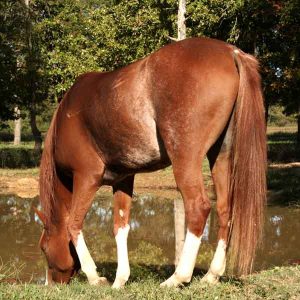
West Nile Virus
West Nile virus is just one of many mosquito-borne diseases that can make your horse very sick. The West Nile virus attacks the nervous system, causing encephalitis (an inflammation of the brain) and/or meningitis (an inflammation of the lining of the brain and spinal cord). Unheard of in North America until 1999, WNV is now found throughout America and Canada
The principle transmitter of the disease is Culex pipiens, commonly known as the northern house mosquito. This little fellow picks up the disease by feeding on an infected bird and then bites your horse, infecting him. In the pregnant mare, WNV may be passed on to the developing foal. There is no evidence that horses can transmit WNV to other horses, birds, or people. The incubation period for WNV ranges from 3 to 14 days.
Interestingly, most horses that are bitten by an infected mosquito do not become ill. For those that do become sick, the symptoms range from mild to severe with about one-third becoming so sick that they die or must be put down. There is no treatment for WNV other than supportive care and proper nutrition. Those that do survive may be negatively affected for months.

Symptoms of encephalitis and meningitis in horses:
First and foremost, it is very important to contact your veterinarian if you suspect your horse is exhibiting central nervous system symptoms. There are a whole host of diseases that may cause similar signs, including rabies, botulism, equine protozoal myeloencephalitis (EPM), as well as Eastern, Western, and Venezuelan encephalitis viruses. Proper and timely diagnosis and treatment is imperative.
You may see any combination of these typical clinical signs:
- Loss of appetite and depression
- Fever
- Weakness or paralysis of hind limbs
- Random muscle twitching
- Incoordination
- Head pressing
- Aimless wandering
- Impaired vision
- Inability to swallow
- Convulsions
- Circling
- Hyper excitability
A two-pronged prevention program is the key to keeping your horse safe and well.
1. Vaccinate your horses:
Fortunately there are vaccines that will protect your horse against West Nile virus. Depending on the type of vaccine used and your horse’s risk factors, after an initial series is administered, at least one yearly booster is recommended. Horses that are competing, racing, or otherwise stressed should have two boosters, one in April and one in late June. If you have broodmares, young horses or geriatric horses, consult with your veterinarian regarding the proper immunization schedule. Don’t confuse the Eastern, Western and Venezuelan equine encephalitis vaccine with the WNV vaccine; the former does not protect your horse against West Nile virus.
2. Keep mosquitoes away:
Mosquitoes are most active at dusk and dawn, so keep horses indoors during these times of peak activity.
Spray your horse with a mosquito repellant that is specifically developed for horses.
Use fans in stalls to keep the air moving; this will deter mosquitoes from hanging around.
Keep lights out in the barn at night, as they attract mosquitoes!
Eliminate places where standing water can accumulate and stagnate; these are perfect breeding grounds for mosquitoes.
- Remove old tires
- Clean up empty containers or kids’ toys
- Fix clogged gutters and drainage areas
- Maintain bird baths
- Turn over unused buckets and water tanks
- Aerate ornamental pools or stock them with fish
- Clean and chlorinate swimming pools when not in use
- Turn over wheel barrels and plastic wading pools when not in use
Implement an evening fogging program to reduce mosquito numbers. For suggestions on the best program for your area, contact your local county extension office, Department of Environmental Protection, Department of Health, or your veterinarian.
Don’t house chickens or other birds close to the barn; move them to another area of your farm.
Understanding the disease, implementing a prevention program, and knowing the signs of West Nile virus will help you keep your horses safe and healthy.
To track the activity of WNV in your area, visit the CDC website.



1 Comment
Pingback
[…] Best of the Blogs: Do you know how to protect your horse from West Nile Virus? Our friends at Kentucky Performance Products share some preventative measures. [KPP] […]